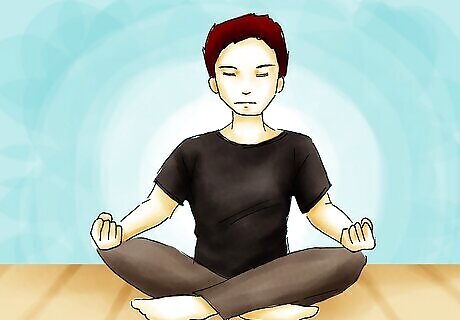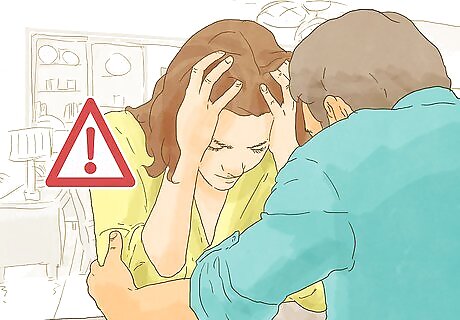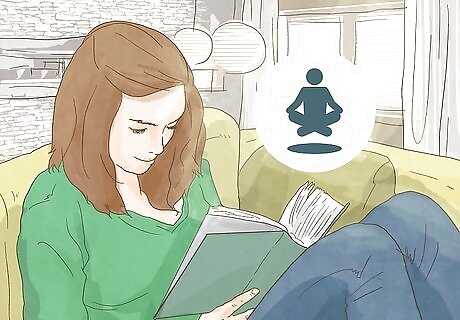
views
Practicing Self-Care

Have compassion for your inner child. Acknowledge your inner child and ask yourself, what brought me the most joy as a child? While growing up, we are all often told how to act and speak, and we may be punished for how we feel because of how we respond and/or react to others. Acknowledge all negative feelings you may have suppressed as a child. Remember that anger often masks sadness, and your automatic responses (such as to fear) may entail defense mechanisms. Your subconscious senses a threat to self-esteem and reacts to "separate" you from the unpleasant event, action, or thought. Some emotional triggers stem from the way you were treated as a child. Approach these responses with curiosity, not self-judgment. Only once you identify these reactions can you begin to work through them.

Feel with no judgements. Be nice to yourself. Recognize that you live in a world riddled with constant judgments by others and much of what we learn as we grow up is from whoever we are closest to. Refrain from blaming yourself or others, and focus on something you can control or aspire towards.

Forgive yourself. Recognize that excessive and unnecessary thoughts regarding how you may feel are often not logical. Apologize to yourself for not knowing what you may know now. Give yourself time to process how you feel.

Love yourself unconditionally by practicing loving and appreciating yourself. Recognize that love cannot be forced; if you find yourself constantly seeking love, you need to stop. Remember that the person who may be able to love you the best is yourself. Set boundaries with friends and family. Speak positive affirmations to yourself. Make a list of obtainable goals. Spend more time alone to rediscover who you are outside of social pressures.
Connecting With Your Body

Silence your thoughts. You must be willing and able to acknowledge how your body feels, which may be uncomfortable at times and will require a lot of self-discipline. Practice controlling your thoughts by sitting quietly and still in a comfortable position. This way, you can better connect your mind with your body. Keep your eyes closed while you focus on breathing slowly and deeply through your nostrils. Spend between 10-15 minutes focusing solely on breathing. Move and stretch your body during this time if need be. Afterwards write down a list of any discomforts that you feel within your body.

Identify your wants and needs. Life is all about wants and needs. Recognize that wants may be materialistic while needs are necessary. Make a list of your wants and needs, especially when seeking companionship from others. Ask yourself, what do I need? Focus on your needs.

Find your purpose. Practice gratitude daily. Recognize that we are all essentially the same on this Earth, as we are all humans who are prone to experiencing great mental suffering. Some people may hide their feelings more than others. Make an effort to form meaningful connections with people who you share interests with.

Trust the process. Refrain from comparing yourself to others and have compassion for yourself. Recognize that suppressing uncomfortable feelings no longer serves you. Focus on being present in the moment. Remember that feelings come and go, and no feeling is meant to be permanent. Trust yourself and your ability to move forwards.
Holding Yourself Accountable

Recognize how you react to others when you are upset. Other people's behavior may bother you, but remember that you only have control over your own thoughts and actions. Additionally, remember that reactions may be triggered by a feeling that you have experienced before. Take a moment to feel before you react and ask yourself, Have I felt this feeling before?

Choose to respond to others rather than react. Remember that reactivity can be self-destructive. Responding is more respectful and encourages open conversation, whereas reacting may have the opposite effect. Recognize that sometimes what we feel is unconscious. Acknowledge any unpleasant feelings and ask yourself, How does my body feel?

Pay attention to how your body feels. Acknowledge every ache and pain you feel. You will learn to respond rather than react because you are now more aware of the physical pain that has been inflicted on your body. Practice becoming more aware of any pains in your body every day.

Choose to be present. Stop trying to understand everything. Getting better at feeling entails no logical thinking— explaining away emotion with logic lures you into a false sense of comfort that becomes a barrier to feeling more deeply. Silence the narrative in your mind and remember that being present is a journey. Acknowledge that you are getting better at feeling and that you have control over your own body, mind, and emotions.




















Comments
0 comment